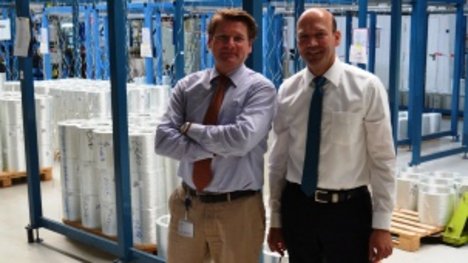International interest in the development work

Lightweight leaf springs for heavy-goods vehicles by IFC Composite in Haldensleben last longer
The lightweight manufacturers from Haldensleben are bold. They want to attract key players as customers or, as the boss say: "we will crack them". This refers to heavy-goods vehicles and their leaf springs made from steel. The company IFC Composite is developing a leaf spring, which is composed of dozens of layers of fibreglass soaked in resin, for a new generation of trucks. It will be a featherweight on the road.
Still, says Oliver Schimpf, lightweight construction is struggling in the public perception. "But if you want to have a 40-ton truck, prevent the roads from damage, and consume less fuel, it is impossible to avoid components made from fibre composite materials." The CEO of IFC Composite in Haldensleben is also confident about the development of a leaf spring for heavy commercial vehicles. After all, all international market leaders in truck construction as well as development partners have shown interest in the leaf springs by IFC Composite.
This interest is based on the great confidence in the experience, innovative capacity and precision of the company. Already 1.5 million Mercedes-Benz Sprinter vans, which have been built by Daimler AG since 2004, have leaf springs from Saxony-Anhalt. The high quality of the leaf springs is regarded around the world. "One must bear in mind that there has not been a single complaint so far", says Schimpf with pride. According to his knowledge, this rate is unrivalled.
The glass and carbon fibre-reinforced plastics (GFRP and CFRP), from which leaf springs as well as shafts, stabilisers or coupling elements for wind turbines are built, are automatically produced by 40 employees of IFC. Very small quantities or components for tests are made by hand. The continuous fibres are drawn and impregnated with resin on a support layer. A machine stacks the strips and cuts them to length in an air-conditioned environment. The components are created by cooling, heating, resting and pressing at several stages. Depending on requirements, the glass fibres are then aligned uniformly or from layer to layer at predefined angles.
"A GFRP component combines several advantages", explains Rüdiger Trojahn. The plant manager considers the strongest selling point to be the weight. "Our Sprinter leaf spring is 20 kilograms lighter that its steel predecessor – that is an 80 percent weight reduction." Added to this is the break resistance. If the material is damaged, only the top layer is frayed. This means that components can be replaced early on. "Steel breaks." Steel will also become brittle in cold regions, glass fibre-reinforced plastic will not. GFRP also scores highly with its resistance to corrosion and its high durability in offshore wind farms.
Nevertheless, the market first needs to change. "No one pays three times the amount just because of its low weight", says Schimpf. To be able to establish the expensive material with customers, it must also be more efficient. IFC Composite therefore specialises in components that combine several functions. "Instead of springs with five leaves, ours only have one. From a seat with 80 components, we produce one with 14."
This certainly arouses the interest of the industry. "Anyone working with plastic leaf springs comes here. Engineers from the USA, India, China and Korea have visited us. They value our potential", says Schimpf. And they contribute to the development costs, explains Trojahn. "Just last month we received a 500,000 euro development contract."
Due to the so-called pre-preg process, IFC Composite claim to be the world's only provider to be able to deliver fibre composite components of this quality, precision and quantity. It was able to quickly increase production from 250,000 components to one million components a year. This was also possible due to the parent company behind it, IFA Rotorion Holding GmbH. The 1,500-person company produces joints and shafts for the international automotive industry. "If we manage to get our leaf springs into mass production, the company stands on secure legs." Schimpf also seems to be confident in this. "We had five million euros in turnover in 2013. We can most likely quadruple this by 2018."
IFC Composite has grown slowly but steadily since its founding as a spin-off in 2005. Success takes time and patience. CEO Heinrich von Nathusius protected the employees during the 2009 crisis. "That was a huge act", remembers Trojahn. "We fell from 140 percent utilised capacity in a four-shift system to 20 percent. But no one had to be let go." Nathusius, who bought IFA-Gelenkwellenwerk from a trust after German reunification and started with just 80 employees, was regarded as a considerate, business-oriented and patient man. These are virtues that his son and current CEO Felix von Nathusius also maintains.
This characterises the atmosphere of IFC Composite. The employees appreciate the security that the company provides. This concerns perspectives on further developing staff personally and professional. There is no debate about the location, assures Schimpf. This is because of the history. "Gottlob Nathusius founded the first company in Germany here 300 years ago. The Nathusius family has since been rooted in Haldensleben and the majority of jobs should also be here in the future." In a region of Saxony-Anhalt, in which people "can actually do something", as Schimpf describes it. "They are very down to earth and they can be relied upon."
Out of this confidence that the skilled employees, senior management and customers bring to the company, and that the old and young members of the Nathusius family in turn bring to the employees – from this confidence Oliver Schimpf presents the 40-ton truck to the world: "we will crack them".
Contact:
Rüdiger Trojahn – Plant Manager
IFC Composite GmbH
Jacob-Uffrecht-Str. 2
39340 Haldensleben
Tel.: +49 (3904) 72506 - 180
mobile: +49 (172) 3833494
E-Mail: ruediger.trojahn.ignore@ifc-composite.de
Web: www.ifc-composite.de
